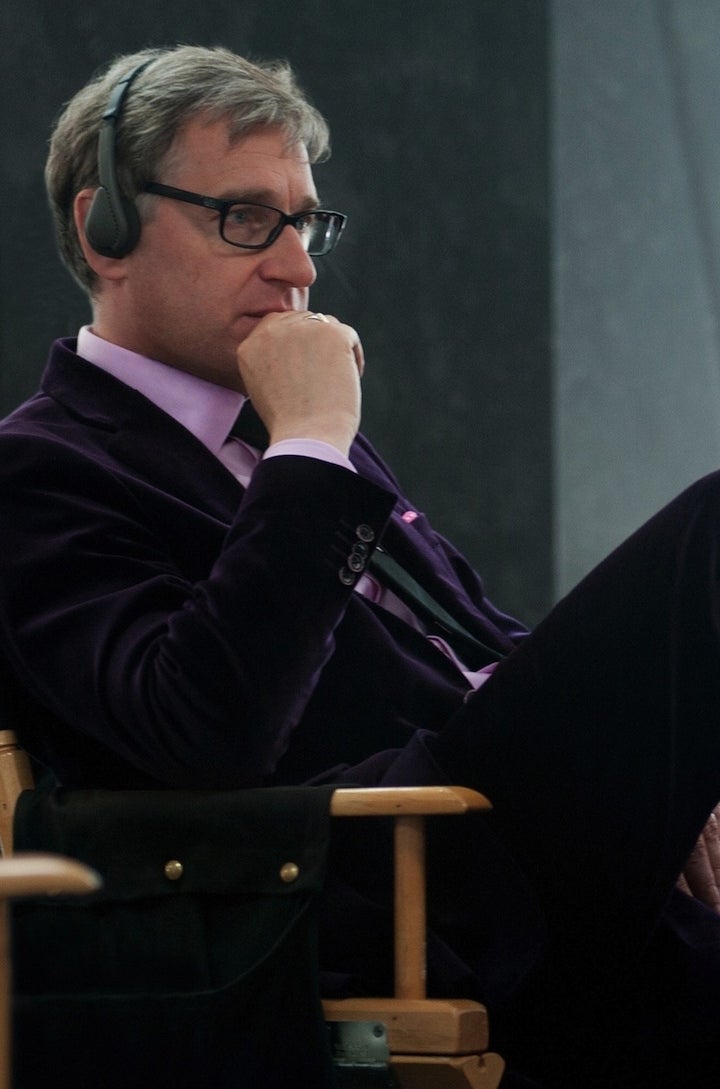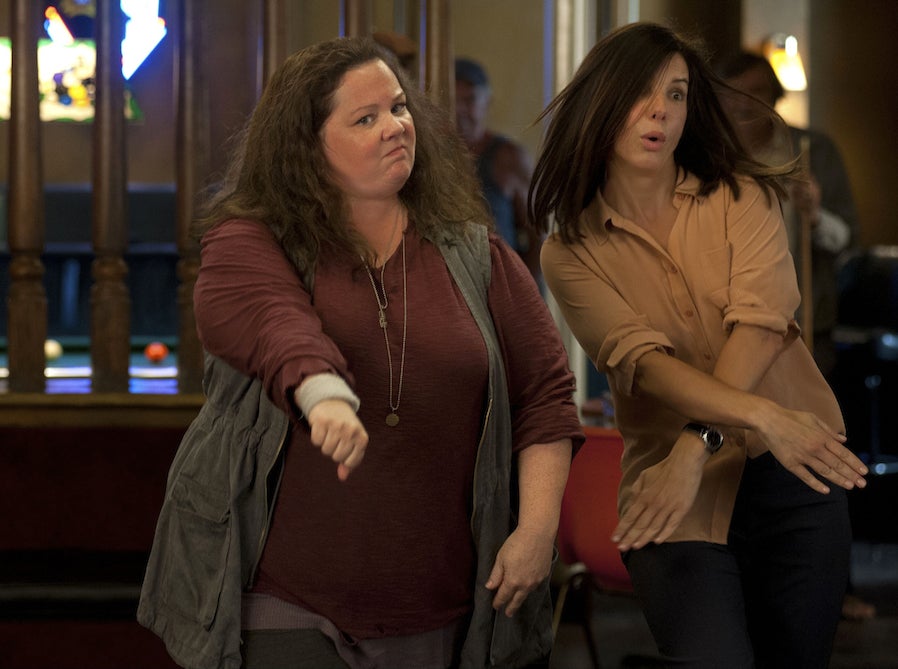

Before he made last summer's hit comedy The Heat, Paul Feig avoided watching other buddy comedies that struck a similar tone to his film, which follows the unlikely partnership between a straight-laced F.B.I. agent (Sandra Bullock) and a take-no-prisoners Boston cop (Melissa McCarthy). "I always get nervous about stealing direct ideas," Feig says. "I'm less dependent on that and more just going, Well, this is just a funny dynamic."
What is most important for Feig is that that funny dynamic between his lead characters isn't also a rigid one, "where one person is just in a specific role — I'm just the crazy one, I'm just the mean one," he explains. Feig likes it when the characters in his comedies are more fluid in how they play off each other, much like these four classic comedy duos he watched via reruns when he was growing up in the 1970s — duos who, Feig says, "weirdly influenced how I process comedy." One duo in particular influenced an extended scene from The Heat's Blu-ray edition (out Oct. 15), which you can watch exclusively below.
Laurel and Hardy
View this video on YouTube
Feig says his love for the pairing of the portly Oliver Hardy and the maladroit Stan Laurel — made famous in a serious of comedy shorts and features from the 1920s through the 1940s — has "nothing to do" with their knack for physical comedy. "The dynamic between Sandra and Melissa [in The Heat] reminded me lot of Laurel and Hardy," he says. "One is sort of a do-gooder, and the other one is frustrated with the first one all the time. I thought that was really funny. When reviews would say that Sandra was the straight man, I was like, 'No!' That's what I like about Laurel and Hardy — neither one is the straight man. They're both funny in their own way: Stan Laurel, because he's this child-like presence, but then he turns and gets mean sometimes and that's hilarious; and then Oliver Hardy is just mad at him all the time, but then when he gets flustered, it's super funny. I like that."
The Marx Brothers
View this video on YouTube
One wouldn't normally think of Groucho, Harpo, and Chico Marx as a "duo," but Feig explains that he loved it when the famed 20th century comedy act would pair off. "Groucho and Chico — I enjoyed that, because Groucho would fall into the role of being frustrated by Chico's double talk," he says. "But when it was Harpo and Chico, then Chico was frustrated by Harpo's weird take on the world. He wouldn't listen to what he was saying. And then when Harpo and Groucho were together, Groucho would more set up Harpo for jokes and enjoy it. I liked that shifting dynamic."
Bob Hope and Bing Crosby
View this video on YouTube
From 1940 to 1962, Hope and Crosby starred in a series of seven "Road to…" movies that were wildly popular in spite of their less-than-stellar production value and quality. "They all have their funny moments," says Feig. "Hope was always preening and confident, but he was the coward. And Bing was more of a straight man, but then he'd be funny because he had this sort of like cool guy thing. I liked that dynamic a lot... Are they great movies? No, they're not. The plots are kind of silly or whatever. But you just wait for those moments of interplay and what were clearly ad-libs or improv moments that were almost very referential and breaking the fourth wall." That easy-going, loosely scripted feeling in those films very much carried over into Feig's work as a director today. "I like any comedy that feels like it's happening in the moment. What I don't like is to go, like, 'That's so scripted.'"
Daffy Duck and Bugs Bunny
View this video on YouTube
"I love Daffy Duck," says Feig. "He's kind of my favorite [Looney Tunes character] because he was, like, crazy. I really liked the cartoons where it was him tormenting a hunter or a dog or something. Those are always my favorites, because he could just go unhinged. When he got together with Bugs Bunny, he always became more the one who was being frustrated. He was the object of Bugs Bunny's attacks. He keeps getting his face blown off and his beak is always getting pulled around to different parts of his face. You see the dynamic — there's two different sides that he plays, depending on who he's playing up against. And then Bugs Bunny's funny because he's always in charge."
This Looney Tunes twosome especially sprang to mind when Feig shot a scene in The Heat that was ultimately cut from the film, in which McCarthy's character steals Bullock's character's car keys, and then torments her in a local bar with a game of "hot and cold" when she tries to get them back. "It just made me laugh, because, more than anything, it felt like a Warner Bros. Daffy Duck/Bugs Bunny moment to me," says Feig. "We cut it out because it didn't quite work in the context of the film, but it just made me laugh."
You can watch the scene — included in the Blu-ray edition of The Heat that arrives on Tuesday, Oct. 15 — exclusively here:
Thumbnail image credit: © Warner Brothers / Courtesy Everett Collection

![Feig says his love for the pairing of the portly Oliver Hardy and the maladroit Stan Laurel — made famous in a serious of comedy shorts and features from the 1920s through the 1940s — has "nothing to do" with their knack for physical comedy. "The dynamic between Sandra and Melissa [in The Heat] reminded me lot of Laurel and Hardy," he says. "One is sort of a do-gooder, and the other one is frustrated with the first one all the time. I thought that was really funny. When reviews would say that Sandra was the straight man, I was like, 'No!' That's what I like about Laurel and Hardy — neither one is the straight man. They're both funny in their own way: Stan Laurel, because he's this child-like presence, but then he turns and gets mean sometimes and that's hilarious; and then Oliver Hardy is just mad at him all the time, but then when he gets flustered, it's super funny. I like that."](https://img.youtube.com/vi/1EkQlh-lxu4/mqdefault.jpg)


!["I love Daffy Duck," says Feig. "He's kind of my favorite [Looney Tunes character] because he was, like, crazy. I really liked the cartoons where it was him tormenting a hunter or a dog or something. Those are always my favorites, because he could just go unhinged. When he got together with Bugs Bunny, he always became more the one who was being frustrated. He was the object of Bugs Bunny's attacks. He keeps getting his face blown off and his beak is always getting pulled around to different parts of his face. You see the dynamic — there's two different sides that he plays, depending on who he's playing up against. And then Bugs Bunny's funny because he's always in charge."
This Looney Tunes twosome especially sprang to mind when Feig shot a scene in The Heat that was ultimately cut from the film, in which McCarthy's character steals Bullock's character's car keys, and then torments her in a local bar with a game of "hot and cold" when she tries to get them back. "It just made me laugh, because, more than anything, it felt like a Warner Bros. Daffy Duck/Bugs Bunny moment to me," says Feig. "We cut it out because it didn't quite work in the context of the film, but it just made me laugh."
You can watch the scene — included in the Blu-ray edition of The Heat that arrives on Tuesday, Oct. 15 — exclusively here:](https://img.youtube.com/vi/e3GE-DrE3eE/mqdefault.jpg)